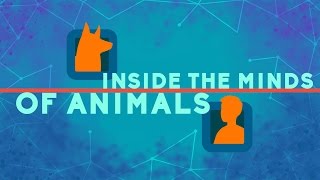(单词翻译:单击)
Your dog loves to curl up on the couch, but so do you, so you shoo him off and settle in for a cozy evening.
你和家中的小狗都喜欢蜷窝在沙发上,于是你赶走小狗,自己享受舒适的夜晚。
After all, you're the human around here.
毕竟,你才是这里的人类。
You're an intelligent being, not a simple creature of instinct.
你是有智慧、并不单靠本能的高等动物,
You can plan and dream, and oh... Did your dog just outsmart you and feel happy about it?
你可以计划和梦想,那你的小狗会比你聪明,并且感到沾沾自喜吗?
Or was he just following his instincts? Is there even a difference? What is he thinking?
又或者它只是按照自己的本能行事?这样有什么分别么?它正在想什么呢?
Well, it depends on what we mean by 'thinking' and the criteria we use to evaluate it.
恩,这个要取决于我们如何定义“思考”以及我们用来评价的标准。
Aristotle and Descartes both use the criteria of instinct and intelligence to divide animals from humans.
亚里士多德和笛卡尔使用本能和智慧作为评价标准来区分动物和人类。
Aristotle believed that humans possess reason,
亚里士多德认为人类是理性的,
while animals could only follow brute instincts for survival and reproduction.
而动物只能是靠本能繁衍生息。
Almost 2000 years later, Descartes suggested a more extreme version of that idea,
大约2000年以后,笛卡尔提出了一个更加极端的想法,
arguing that animals following instincts were indistinguishable from robots responding mechanically to stimuli in their environments.
认为动物依赖本能行动和机器人机械的对其周围环境做出的反应是一样的。
But the consensus against animal intelligence began to unravel with Darwin's Theory of Evolution.
但这种反对动物有智慧的想法被达尔文的进化论所推翻。
Darwin hypothesized that intelligence could evolve from simpler instincts.
达尔文认为智慧就是从简单的本能所发展过来的。
He had observed earthworms making choices about how to drag oddly shaped leaves into their boroughs,
他发现,蚯蚓不断学习如何把奇形怪状的树叶拉回巢穴,
and was struck that a human might employ similar means to solve a similar problem.
其实人类也会采取相似的手段解决类似的问题。
And if, as he thought, humans are descended from simpler creatures,
如果正如他所想,人类是从简单生物进化而来,
then perhaps our minds lie at the far end of a continuum, differing from theirs in degree, but not in kind.
那么,很有可能人类的思想是源自远古的动物,但是在程度上有些分别,不是一模一样。
Recent experiments showing that many species can solve complex problems confirm Darwin's initial hypothesis.
最近的实验表明很多物种都可以解决复杂的问题,这些验证了达尔文最初的假设。
Elephants use objects to reach inaccessible places.
大象懂得利用物件伸向摸不到的地方。
Crows make their own tools, and can use water displacement to get a reward.
乌鸦会制造自己的工具并懂得利用排水法来获得奖赏。
Octopuses can open jars after watching others do so, and can even remember the process months later.
八爪鱼会效仿他人打开盖子,而且甚至在若干月后仍记得这个过程。
Such tasks involve considering aspects of a problem separately from the immediate situation,
上述的动作,需要在思考问题时排除事件当时的情境,
and retaining the strategy for later use.
并且把这种方法留待日后再用。

Still, while animals can solve complex problems, how do we know what, or even that, they are thinking?
可是,即使动物能够解决复杂的问题,那么我们是怎么知道的呢?
Behaviorists, such as Pavlov and Thorndike,
行为学家,如巴布罗夫和桑代克,
argue that animals that appear to think are usually only responding to reward or punishment.
认为动物开始思考仅仅是因为它们对奖赏或是惩罚的反应。
This was the case with Clever Hans, a horse with the amazing ability to tap out answers to math problems.
有一种匹马叫聪明汉斯,它精通计算,用马蹄踏地来回答数学问题。
But it turns out Hans wasn't especially good at math,
但事实证明,汉斯并不是数学奇才,
but at reading his unwitting trainer's subtle nonverbal cues for when to stop tapping.
而在于它善于读懂训练师非语言形式的微妙暗示,知道什么时候停下来。
So Hans couldn't count, but does that mean he wasn't thinking?
所以汗斯并不会计算,但是这就意味着它没有在思考么?
After all, he could interpret nuanced social messages, a quality he shared with many other non-human animals.
别忘了,它能够理解这种微妙的社会信息,这是一种和其他非人类的动物一样的特质。
Elephants recognize each other after years apart, and even seem to mourn their dead.
在分开若干年后,大象仍然能够辨别出彼此,甚至能够哀悼死去的大象。
Bees communicate using a special waggle dance to indicate the location and quality of a food source to other bees.
蜜蜂通过一种特殊的摇摆舞进行交流,告诉同伴食物的位置和质量。
Chimpanzees engage in complex deception schemes,
黑猩猩能够参与复杂的欺骗计划,
suggesting not only do they think, but they understand that others do, too.
这表明了它们不但能够思考,而且知道他人也懂得。
And then there is Alex the Grey Parrot,
还有一只非洲灰鹦鹉艾利克斯,
who could use human language to distinguish the colors and shapes of absent objects,
它可以运用人类的语言去辨别出不在眼前的颜色和形状,
and even understand abstract concepts, like bigger and smaller.
甚至能够理解抽象的概念,比如更大和更小。
That sounds a lot like intelligence, and not just the work of mindless machines.
这听起来似乎是很有智慧,并不只没有思想的工作机器。
But while a non-human animal can solve problems and even communicate,
但是当一个非人类的动物可以解决问题,甚至是交流时,
for humans, thinking also involves consciousness, the ability to reflect on our actions, not simply to perform them.
对人类来说,思考也包括意识,这种能力反应在我们的行为上,而不是简简单单的执行。
So far, none of our studies tell us if having the intelligence to outsmart us
目前为止没有任何研究证明如果狗比我们聪明,
means that our dog can also feel good about doing so.
它们也会感受到愉悦。
What we really want to know is what is it like to be a dog, or an octopus, or a crow?
我们真正想要知道是,作为一只狗,或者一只八爪鱼,或者一只乌鸦,会是怎样一种感觉?
Philosophers of mind call this The Hard Problem,
精神哲学家称之为意识的难题,
because while you and I can report what it feels like to be a human, nobody speaks horse.
因为大家都可以形容人类是怎样一种感觉,而没有人可以说马是怎样一种感觉。
Even a talking parrot, like Alex, couldn't tell us how he feels about the colors he could name.
即使是一只会说话的鹦鹉,比如艾利克斯,也不能告诉我们它对于它所说的颜色是怎样一种感觉。
And what if consciousness comes in different forms?
如果意识以不同的形式表现出来呢?
Would we even recognize the consciousness of bees?
我们还能够识别出蜜蜂的意识么?
For that matter, how can we know for sure that other people have consciouness?
就此而言,我们是如何知道别人的意识呢?
Perhaps they're just well-functioning zombies.
或者他们只是功能卓越的僵尸而已。
Regardless, animal minds continue to test the limits of our understanding
毕竟我们对于认识动物的智慧仍然有限,
and how we frame them may reveal more about our minds than theirs.
而我们对它们的定义,也更多体现了我们的思想。


